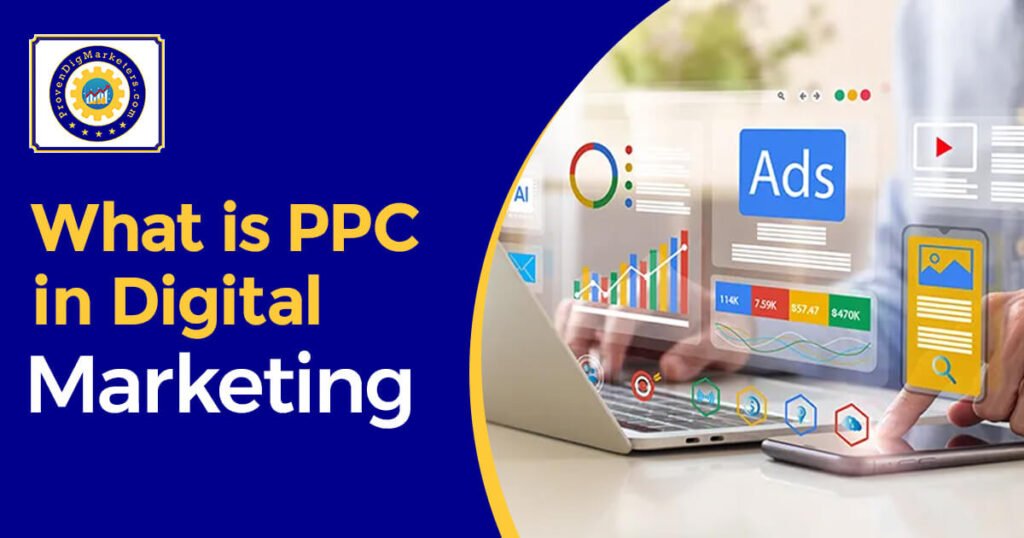What is PPC in Marketing? In today’s digital world, there will be many ways through which a business can find its strategies that will help increase the presence of a site online and will direct more traffic to their site. Among all these tactics, the most effective one is PPC advertising. But what’s the big deal about PPC and how does it even work; and therefore, why should you consider adding it to your digital campaign? We will cover the basics of PPC advertising, discussing several different models of PPC, and most importantly getting to maximize campaigns.

What is PPC in Marketing?
Pay per click is one of the forms of advertisements that occur on the internet wherein a charge is made every time an advertisement is clicked. This can be said to mean buying visits to a website rather than earning them organically. PPC ads are sited on search engines, websites, social media, and hundreds of other places. The most notable examples are Google Adwords; this is a field whereby businesses put a bid on keywords related to their products or services.
For instance, PPC is highly measurable and scalable. That’s a light year away from anything traditional, like television or a print ad where you know how much you are spending, how much you are earning, and what are the best performers. For these reasons, PPC has come out to be the most popular marketing method to gain visibility, generate leads, and boost sales for businesses.
PPC Advertising: Definition and How It Works PPC Advertising in a Nutshell
It is based on a principle of a bid system. The advertiser chooses the keyword that he wants to target and puts his respective bid for those keywords holding an auction. In the case that the keyword or term has entered in the search matched with the advertiser’s bid, then the advertisement will show up at the top of the results page or other pages as a relevant ad.
Selection of Keywords probably are the most important elements of a PPC campaign. Keywords are words that the prospective customer is going to type in the search engine while searching for the products and services that you are offering. Proper keyword selection is pretty crucial because proper keywords ensure your ad reaches the target audience.
Placement of bids:
A marketer puts a bid on the keywords of his choice. These are actually the exact words or phrases he wants his ads to trigger on. That’s the crux of how much he is willing to pay per click to his ad, which defines the bid. Note: He’s not going to get more, but the one who puts in the least. The choice of which ad to show on a page is purely dependent on the size of the bid, the strength of relevance that the ad holds regarding the page, and quality. Most of these determinations are made by the platforms-the Google Ads, among others.
Ad Auction The process holds an auction in real-time the very second the user types out the search query. All of the relevant bids and ads are brought into play for which one would be used to appear with the results of the search query, which factors include several, of which is Ad Rank, which comes from the bid, ad quality, and experience of the landing page.
Ad Display:
The winning ad will appear in the results pages or on a network of displays. In case of a click by an advertiser, then the advertiser pays, as charged according to the amount of the bid by the advertiser.
Success Measurement:
PPC campaigns can pretty easily measure return on investment. Click-through rate, conversion rate and cost-per-click are the aspects that must be measured.
This way, pay-per-click allows targeting the audience so that very relevant traffic flows onto the website but at controlled advertising costs.
Different PPC Models
There are several PPC models that advertisers can use. Each model allows different strategies and opportunities for businesses trying to get the most from their advertisement. The most common PPC models include:
1. Search Ads
Perhaps the most intuitive type of PPC is a search ad. Search ads tend to appear on the top or bottom of SERPs for terms that contain a match to your bid when users search on them. So if someone were searching on “best running shoes,” they probably would have seen an ad that had been specifically crafted into being extremely well-optimized sited atop that page from a sporting goods store.
This model is targeted specifically at the active users who otherwise search for products or services that you provide-always, hence this model results in fruitful lead and sales generation.
2. Display Ads
Display ads are those visible banners or text ads appearing on the website through a display network such as the Google Display Network. Such ads would usually appear before the user based on browsing history or demographics.
These display ads do not reach your search ads directly, but they actually perform pretty well for branding and remarketing to users who otherwise would have interacted with your business.
3. Shopping Ads
Shopping Ads exist solely for online shopping companies. They come as an advertisement that is served by the search engines and carry with it an image of the product and its price or any other information regarding any product available. Sometimes they can be very effective at selling the items themselves as these ads serve rich media content directly within the results themselves.
4. Social Media Ads
Facebook, Instagram, LinkedIn, and Twitter have PPC ads. In these, the company targets their audience using the social media networks with interests, demographics, and behaviors. Social Media Ads could become a rather powerful tool for awareness and conversion-that is, provided other tactics are in support of them.
5. Video Ads
Another form of PPC model is video advertising, which can be included to YouTube and such web sources. Video ads may or may not be skippable by the viewer. Usually, video ads are played just before, during, or after the video content. Video ads facilitate holding the viewer’s attention and interaction in an attractive manner.
6. Remarketing Ads
This method targets those visitors who have actually visited your website but haven’t converted. You re-engage with them for your website and eventually convert them for your desired conversion or any other action by showing them targeted ads elsewhere.
Agenda for PPC Client Meeting: What to Expect
A new PPC client needs an agenda in a meeting with you; it will ensure that you and the client are aligned in respect to expectations, goals, and strategies. Here is a general agenda points for a new PPC client meeting:
- Introduction and Background: Present the business, products, and services of the client and his general marketing objectives.
- Identify Target Audience: Identify the customer profiles and pain points of the clients.
- PPC Objectives: Define very particularly what you want in this PPC campaign-be it traffic flow, lead creation, or even sales.
- Budget and Bidding Strategy: Set a budget for this campaign and talk about your bidding strategy.
- Keyword Research: Begin building a list of all potential keywords as well as any keyword preference or restriction.
- Ad Copy and Creative Review: Keep copies of the ad and Creative Review of the messaging that you want your client to feature in the ad, the tone, and creative assets in reserve.
- Tracking Setup: Tracking Setup of tracking systems, Google Analytics, and conversion tracking, also what the reporting frequency and the metrics for reporting.
Good agenda ensures you and your client are aligned, thus providing a great foundation for a PPC campaign.
Why Get PPC Certification?
There are many providers which offer such certifications that would prove competence in running PPC campaigns in digital marketing, and getting PPC certification can be one of them.
Here are the areas to be covered after passing an exam for PPC Certification:
Keyword Research and Targeting
Ad Copywriting
Campaign Optimization
Conversion Tracking
Bid Management
Being a PPC certified specialist will only make you more credible, and more importantly, allow you to take in the updated knowledge and best practices to ensure that you come up with successful campaigns for your clients or business.
How PPC Model Works: Takeaways
The model PPC works in a bidding system; that is, the advertiser places a bid on those keywords in which he would like to present his ads to the target. He is then paid by the buyer his or her agreed amount if at all the user clicks on his ad. Some of the benefits realized when using PPC include accurate targeting, easily scalable results, and the results are measured.
No matter whether you are doing search, display, or social media ads, the ability to track and optimise brings you the best opportunity to maximize your spending. Proper management and strategy approach to PPC advertising can be a huge boon in the growth of your business.
Conclusion
Currently, digital marketing needs to work mainly through PPC advertising. A fine knowledge of the PPC model, proper selection of your PPC model, and optimization of your campaigns sometimes bring every pound into your budget. This will all be based on a clear working strategy, proper monitoring of performance, and advanced tools, like PPC certifications, which may dramatically increase companies’ presence, bring high-quality leads, and boost sales.
If you are new to PPC or looking forward to upgrading your skills, getting into PPC certification would be the right thing to do, as businesses still assimilate digital marketing as a huge component of their overall advertising platform. In this regard, mastering PPC will place you ahead of the curve when comparing yourself with others in an increasingly crowded online marketplace.


